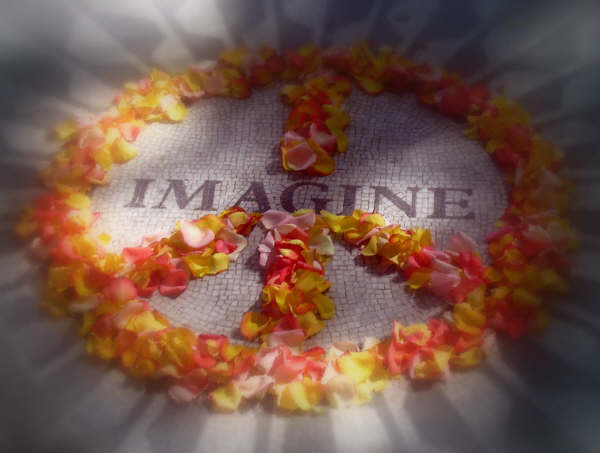Imagine what the Bahá’í Faith might become if its idols were stripped away. What if the burden of divine authority were cleansed from every portrait, every image, every institution, and every holy word?
Imagine there’s no Cov’nant. It isn’t hard to do.
What if the Bahá’í religion were not a cult of divine images (“manifestations”), but rather a fellowship of principles (or virtues)? What if Bahá’u’lláh had said, “never mind about me and my station; let’s get down to the business of world reform.”
I know. It’s a stretch.
If Bahá’ís were to forfeit their sense of divine entitlement, would they lose their famous, unquenchable sense of purpose?
Sorry. I couldn’t resist. I’ll try to keep it serious.
They’d have to give up some very comforting expectations, it’s true. I’m not saying it would be easy.
There’s a word for a religion of principles: unitarianism. Christian unitarians practice “the religion of Jesus, not a religion about Jesus.” What if Bahá’ís could say the same about their religion? What would their religion look like?
Progressive Religion
A central, defining principle of the Bahá’í Faith is “progressive revelation.” According to Shoghi Effendi, it is the most fundamental Bahá’í principle, but alas, it is not completely compatible with unitarian thought, because revelation is a concept that depends on singling out one man or book as standing for God. That’s idolatry, so it will have to go, but we can reform the idea of “progressive revelation.” Rather than thinking of religion as leading mankind according to mankind’s needs, let us rather think of religion as evolving organically in response to mankind’s needs.
Independent Investigation of Truth
This is the most unitarian of Bahá’í principles. Named the first principle of Bahá’u’lláh by `Abdu’l-Bahá’ in Paris Talks, independent investigation of truth is often cited as a fundamental principle of the Bahá’í religion, but it has been undermined by qualifications and exceptions in the interests of idolatry since the earliest days of the Bahá’í religion.
God: To Unity and Beyond
Unity is a problematic notion, because it tends to imply uniformity and common fealty to a single book, person, or idea.
“Absolute Unity excludeth all attributes.”
—Saying attributed to the Imam `Alí, cited by Bahá’u’lláh in The Seven Valleys
Care must be taken when speaking of “Unity of God.” Unity, in this case, must be taken to mean inaccessibility and unknowability. Nothing whatever should be permitted to represent God. The very term “Manifestation” must be stricken from the lexicon. God must be seen as utterly unknowable. To suggest that a particular image, such as a holy book, is more holy than anything else is idolatry.
Ultimately, we must get beyond the term “unity,” for unity itself imposes an image of God that is presumptuous. How can we know that divinity is not fundamentally dualistic? We cannot. We can think of God being characterized by unity in some trivial, truistic way, but to declare the unity of God from pulpits and mountaintops is utter pretense and presumptuousness.
Religious Harmony
“Unity of religion” presents a big problem. It tends to encourage triumphalism, and it threatens cultural diversity. What must be aimed for is not unity, but rather harmony and tolerance.
Human Harmony
I don’t have a problem with the idea that we ought to think of all people as having a great deal in common, and I certainly like the idea of equal treatment under the law, but unity is a dangerous word. Just as it can be abused by religion, it can be abused by the state. Let’s stick with “harmony,” just to be safe. “Harmony” is for unitarians. “Unity” is for idolators.
Equality
Curiously, `Abdu’l-Bahá’s Eleven Principles mention “equality” more times than “unity.” Here are the three equalities that he emphasizes explicitly, plus a fourth principle that implies equality quite strongly:
- Abolition of Prejudices.
- Equalization of Means of Existence.
- Equality of Men before the Law.
- Equality of Sex—Education of Women.
I find it hard to argue of any of these points. They may not be unitarian ideas per se, but they certainly do not conflict with the unitarian principle.
Peace and Non-interference
Here are three more of the principles that don’t conflict with the unitarian principle:
- Religion ought to be the Cause of Love and Affection.
- Universal Peace.
- Non-Interference of Religion with Politics.
Idolatry
I find only two of `Abdu’l-Bahá’s Eleven Principles to be idolatrous:
The first might not seem so bad at first, but it implies that religion and science are one and the same–that “true religion,” because it is infallible, will always confirm science. The implication being that if science fails to comply with “true religion” then science must adapt. I would sooner keep religion and science at arms length, lest the one strangle the other.
As for the Holy Spirit, I don’t have a problem with admitting the existence of unseen, intangible powers, but what `Abdu’l-Bahá’ asserts with respect to this “Spirit” is pure, unmitigated idolatry.
Conclusion
`Abdu’l-Bahá’s idolatry, superstition, traditionalism, and orthodoxy aside, I think that a unitarian theme can be identified in his message. I believe therefore that it would not be unreasonable for a Bahá’í to adopt a unitarian view of the Bahá’í Faith. I also believe that a fundamentalist view would be equally justifiable. No view of the Baha’i Faith can be free of contradiction. The unitarian approach, however, enjoys a particular advantage: it accepts contradiction as an attribute of all human endeavors and moves forward. The fundamentalist clings to the purity of idols until the strain reaches a point of fracture.
